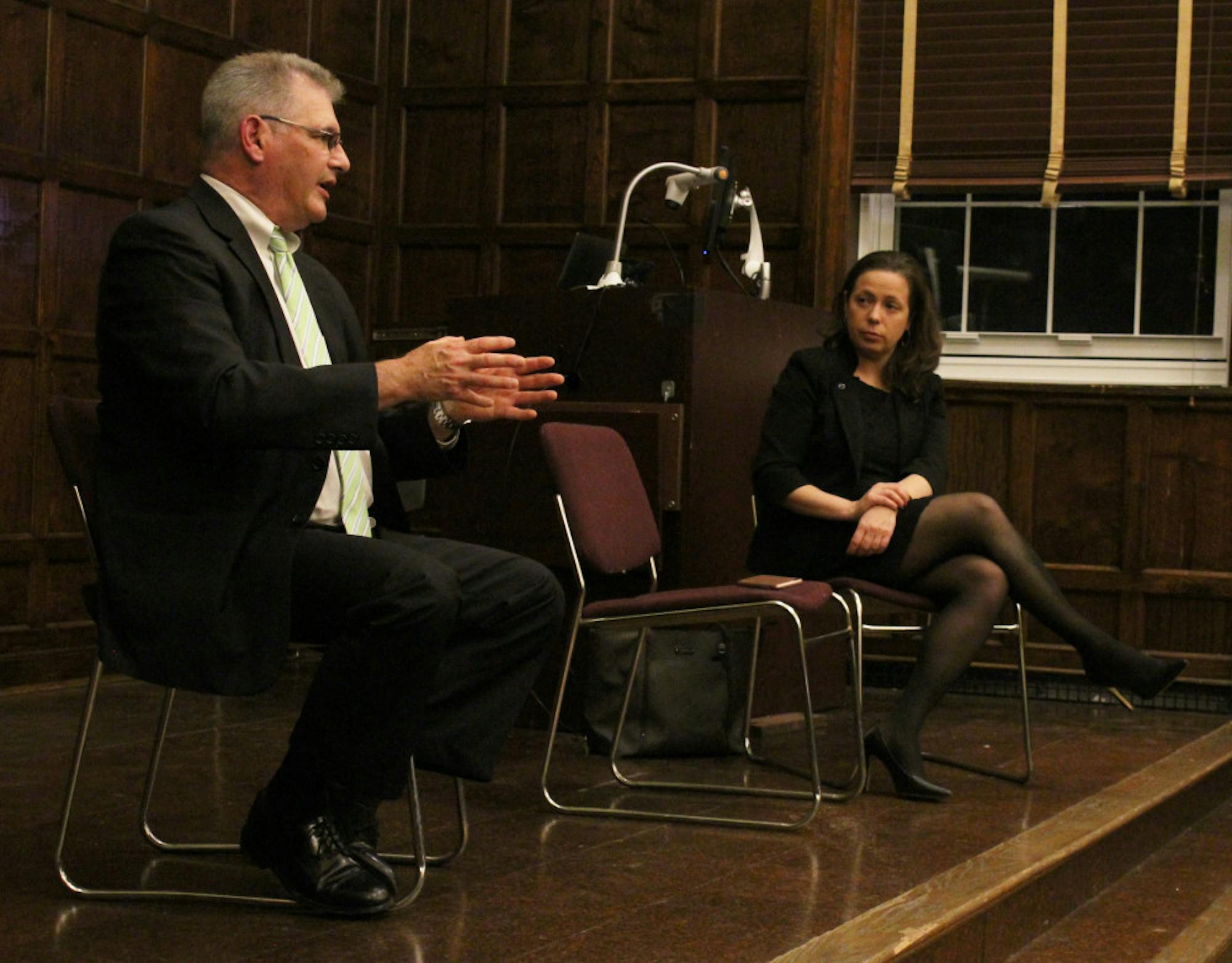Last night the Tufts Democrats hosted their end-of-year symposium in the Crane Room. The keynote speaker of the symposium was Alla Lefkowitz, deputy director of affirmative litigation at Everytown for Gun Safety, an organization that advocates for gun control. According to Tufts Democrats President Misha Linnehan, a senior, the main objective of the symposium was to call attention to and spread awareness about the epidemic of gun violence, a topic that has been the center of political discourse in the United States. About 15 people were in attendance.
Lefkowitz opened by posing a hypothetical situation about a gun crime committed in Kansas City, in which the individual shoots someone, throws the gun and drives away. She asked the audience if anyone knew what happens with the gun once recovered.
“Local law enforcement recovers the firearm and sends a trace report to Bureau of [Alcohol, Tobacco and] Firearms (ATF) and contrary to popular belief, the ATF is not legally allowed to use computers to trace these firearms," Lefkowitz explained.
Lefkowitz described that if a gun is sold legally and used in crime, the ATF must rely on decentralized, physical records from manufacturers, wholesalers and retailers to identify the buyer of the firearm, making it difficult to trace.
“In some states, when guns are bought from person to person, there are no background checks conducted, which makes it hard to gauge how safely it will be used,” she stressed. "These small, less-known laws are why it is so hard to bring an end to gun violence."
Lefkowitz emphasized that 35,000 people die each year from guns in the United States, a number that has risen over past few years. She added that between 12,000 and 13,000 of these deaths were from homicides, and 22,000 were from gun suicides.
“More than just the victims, for every one that dies, two get injured, adding up to 80,000 gun injuries per year," she said.
Lefkowitz went on to talk about gun suicides, a topic she said garners less interest than homicides.
“People think that if someone wants to commit suicide, they will do it, whether they have access to a gun or not,” Lefkowitz said.
In actuality, studies show that people who have survived a suicide attempt will most likely not try again, and since 85 percent of suicide attempts with firearms are fatal, eliminating firearms would largely reduce such suicides, Lefkowitz said.
Although there exist laws which allow individuals the right to have firearms, Lefkowitz mentioned that there is a cost to this legislation, stressing that black men are 13 times more likely than white men to be victims of gun crimes, and seven children who are 19 years old or younger die each day as a result of gun violence.
Lefkowitz explained why she felt it was important to come speak about the issue at Tufts.
“I have been doing this for four years now, and something I noticed is how interested students have become, whether undergraduate or graduate, in this gun violence conversation,” she explained.
She went on to explain that in order to be successful in the mission of Everytown, involving students in the conversation is an important step.
Lefkowitz remarked that Everytown is centered in New York, N.Y. but has chapters all over the country. Their functions involve researchers who find out the causes and statistics of the gun violence events, legal teams who analyze the litigation behind the issue and event organizers for the chapters all over the United States.
"We believe in not only popular policies but those that are evidence and research based," she stated.
Lefkowitz emphasized the regressiveness of gun laws. She referenced a recent Florida law that prohibited doctors from speaking about gun safety. A federal appeals court vetoed the law in 2017.
David Pinsky, a legal representative in Massachusetts, also spoked at the event to discuss the intersection of politics and public policy when it comes to guns.
"The responsibility has fallen upon state government to make [its] own sets of laws to try to protect ... public safety which is first and foremost responsibility," he said. "Strong gun laws help in stopping gun violence. It is a very simple equation. More guns means more deaths."
Pinsky went on to convey that Massachusetts boasted the single lowest rate for gun deaths in all 50 states in 2016 and that the state forms a model for other states to reduce gun deaths.
Pinsky emphasized that under federal law, individuals may purchase a gun as long as they are of age and do not fall under the federal firearm possession prohibition. In Massachusetts, however, police chiefs can prohibit a person from getting a gun, even after the check for federal prohibition. Further, Massachusetts sells a more limited variety of guns than any other state.
"So, people with history of bad driving, drunk encounters, domestic violence and other such instances, can be denied the possession of a fire arm," he concluded.
Tufts Democrats hosts 'Symposium to End Gun Violence'

David Linsky and Alla Lefkowitz speak at the Tufts Democrats' Symposium to End Gun Violence on Apr. 17.





